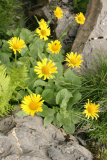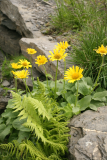Additional notes (click to expand)
Medicinal
The Botanist's Companion (1816): " Arnica- is an emetic, errhine, diuretic, diaphoretic, emmanogogue; and from its supposed power of attenuating the blood. It has been esteemed peculiarly efficacious in obviating the bad consequences occasioned by falls and bruises!"
The flowers and root were used as annarcotic diaphoretic for treating paralysis and rheumatism (1836)
Stephenson, J. & Churchill, JM (1836) Medical Botany . London, John Churchill
Medicinal uses: uses supported by clinical data. None. Uses described in pharmacopoeias and well established documents. As a topical counterirritant for treatment of pain and inflammation resulting
from minor injuries and accidents, including bruises, ecchymoses, haematomas and petechiae (1, 17). Treatment of inflammation of the oral mucous membranes, insect bites and superficial phlebitis (17). Uses described in traditional medicine. Treatment of indigestion, cardiovascular disease, and rheumatism. As an emmenagogue (9). Contraindications: Flos Arnicae is used in traditional systems of medicine as an emmenagogue (9), and its safety during pregnancy and nursing has not been established. Therefore, in accordance with standard medical practice, the flower heads should not be administered to pregnant or nursing women. Flos Arnicae is also contraindicated in cases of known allergy to Arnica or other members of the Asteraceae (Compositae) (37, 42, 50, 51).
Other use
From Patient information leaflet for preparations licensed as Traditional Herbal remedies in the UK.
Indication: symptomatic relief of muscular aches, pains and stiffness, sprains, bruises and swelling after contusions - as a gel
Medicines and Health Care Regulatory Authority, 2013 Licensed Traditional Herbal Remedies
Toxicity
Side effects/precautions: hypersensitivity; do not use if pregnant; may cause skin and subcutaneous tissue disorders, contact dermatitis.
From Patient information leaflet for preparations licensed as Traditional Herbal remedies in the UK.
Medicines and Health Care Regulatory Authority, 2013 Licensed Traditional Herbal Remedies
Geographical distribution
- Europe
Arnica montana L.
Family: ASTERACEAEGenus: Arnica
Species: montana L.
Common names: Arnica; Mountain Arnica
Distribution summary: C. & N.Europe
Habit: Perennial
Hardiness: H5 - Hardy; cold winter
Habitat: Dry, sunny, rocky mountains
Garden status: Currently grown
Garden location: Plants in pots (POT)
Flowering months: July
Reason for growing: Medicinal, other use, toxic, traditional herbal registration

